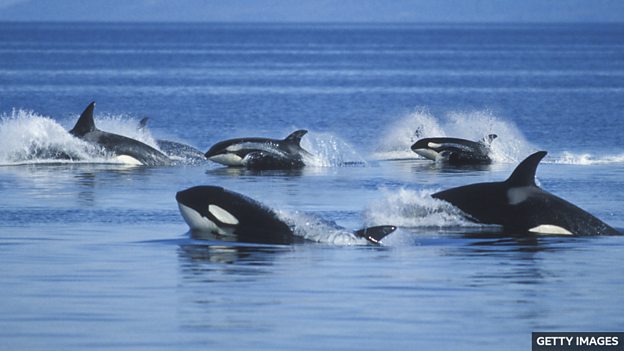媒體英語(yǔ)
Killer whale mothers look after sons for life 虎鯨母親為照顧兒子付出一生

一項(xiàng)對(duì)北太平洋虎鯨的研究表明,虎鯨母親為兒子做出 “終身犧牲”。
The sound of a very close bond. A killer whale mother and son surfacing together, because in orca family life, offspring stay by their mother's side into adulthood.
從這段聲音中可以聽(tīng)出虎鯨親密的母子關(guān)系。音頻中的虎鯨母子一起浮出水面,因?yàn)樵诨ⅥL的家庭生活中,后代直至成年之后一直待在母親身邊。
But sons are particularly dependent on their mums. Well into adulthood, males will demand to be fed fish by their mothers, even though they're much larger than females.
然而,雄性虎鯨尤其依賴于它們的母親。即便早已成年,雄性虎鯨仍會(huì)要求母親給它們喂魚(yú),盡管它們遠(yuǎn)大于雌性虎鯨。
But that close family bond comes at a cost. This new study showed that having a son cut by half a mother's chance of reproducing again in the future. The scientists believe that mothers invest so much of their energy and effort in their male offspring because the biggest, oldest ones tend to father most of the new calves in a killer whale pod.
但建立這種親密的家庭關(guān)系是要付出代價(jià)的。這項(xiàng)新的研究表明,養(yǎng)育一頭雄性虎鯨會(huì)使虎鯨母親未來(lái)再次生育的幾率減半。科學(xué)家們認(rèn)為,虎鯨母親將如此多的精力投入到雄性后代身上是因?yàn)轶w型最大、最年長(zhǎng)的雄性后代往往會(huì)成為虎鯨群中大部分新生幼崽的父親。
As well as providing an insight into the complex, close-knit lives of these marine mammals, the findings could help us protect them. Understanding how much it costs to raise the next generation of orcas is an insight into what these mammals need to survive.
這些發(fā)現(xiàn)不僅能讓我們深入了解虎鯨這種海洋哺乳動(dòng)物復(fù)雜而親密無(wú)間的生活,還能幫助我們保護(hù)這一物種。了解虎鯨養(yǎng)育下一代所付出的代價(jià)讓我們更深刻地認(rèn)識(shí)到這類(lèi)哺乳動(dòng)物生存的基本所需。
詞匯表
bond 關(guān)系,紐帶
surfacing 浮出水面
offspring 后代
adulthood 成年(期)
reproducing 生育,繁殖
close-knit 親密無(wú)間的
閱讀理解:請(qǐng)?jiān)谧x完上文后,回答下列問(wèn)題。
1. How long do orca offspring stay with their mothers?
2. True or False? Male orcas are much bigger than females.
3. Why do scientists believe orca mothers invest so much in their sons?
4. What benefits could come from the findings of this study?
答案
1. How long do orca offspring stay with their mothers?
Orca offspring stay by their mother's side into adulthood.
2. True or False? Male orcas are much bigger than females.
True. Males are much larger than females.
3. Why do scientists believe orca mothers invest so much in their sons?
Because the biggest, oldest orcas tend to father most of the new calves in a killer whale pod.
4. What benefits could come from the findings of this study?
As well as providing an insight into the complex, close-knit lives of these marine mammals, the findings could help us protect them.



